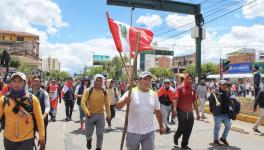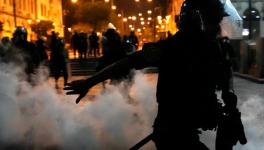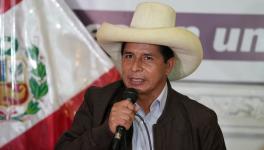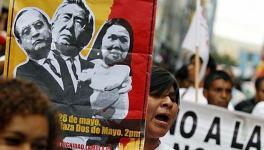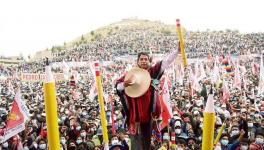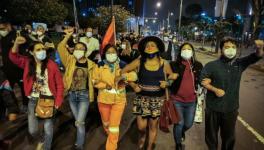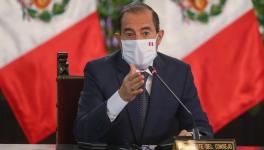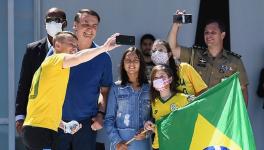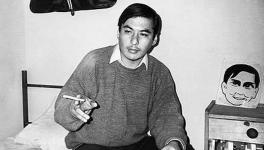Left Candidate Pedro Castillo Wins First Round of Presidential Elections in Peru, Heads to Run-off
Covid-19 in Peru, José Pedro Castillo of the left-wing Free Peru party won the first round of the presidential elections held in Peru on April 11. Photo: Aldair Mejía/La República
José Pedro Castillo of the left-wing Free Peru political party won the first round of the presidential elections held in Peru on April 11. According to the preliminary results by the National Office of Electoral Processes (ONPE), as of 02:00 pm local time on April 12, Castillo has obtained 18.9% of the votes. Castillo’s victory has come as a total surprise because until a week ago, he didn’t appear among the leading candidates in any of the opinion polls.
Following Castillo, in second place is Keiko Fujimori of the far-right Popular Force party with 13.2% of the votes. She is followed by Hernando de Soto of the center-right Go on Country party with 11.9%, Rafael López Aliaga of the right-wing Popular Renewal party with 11.8%, Yonhy Lescano of the center-right Popular Action party with 9.1%, and Verónika Mendoza of the progressive Together for Peru with 7.8%.
Likewise, the quick count by the Ipsos pollster consolidated Castillo’s victory with 18.1% of the votes. It also ratified the uncertain scenario regarding who his opponent will be in the run-off elections on June 6. According to the results of the quick count also, Fujimori is in second place with 14.5% of the votes and is followed by López Aliaga with 12.2%, and De Soto with 10.7% of the votes.
The ONPE declared that as the results show a technical tie between the three contenders, Castillo’s opponent cannot be declared until all votes are counted. On April 12, Jorge Salas, the president of the National Elections Jury (JNE), informed that the official results will be released in the first week of May.
With respect to the legislative elections, both the official results by the ONPE and the quick count by the Ipsos indicate that the new Congress will be highly fragmented with 11 parties having representation in the unicameral parliament and no party having an absolute majority. Free Peru, Popular Force, and Popular Action parties will have the maximum number of seats.
After the announcement of exit poll results, which showed Castillo in first place, at midnight on April 12, he celebrated his victory with his supporters in the Chota city. He called on his supporters to remain calm in the face of provocations and attacks by right-wing forces against him and his political movement. “Tomorrow is a new day, not a day of immediate change, but of a struggle to undertake it,” he said. With regard to his battle for presidency in the run-off, which would require him to seek support of other political forces, he stressed that “the great alliance has to be made with the true Peruvian people.”
Meanwhile, the candidates disputing for the second place reacted differently. Fujimori, the daughter of former dictator Alberto Fujimori, called on her representatives working at the polling tables to be careful and save every vote. She also called on the right-wing forces to join efforts in the run-off to prevent the victory of those like Castillo, who seek to change the country’s current neoliberal and unequal constitution, drafted under the rule of her father’s dictatorship. López Aliaga alleged that he had won the elections and insisted that there had been electoral fraud. He accused the electoral body of lacking transparency and said that he has his own computing center and that he will not let anyone steal these elections from him. De Soto recognized that the margin of votes between the contenders is very narrow and that he would wait for the final results.
On the other hand, Lescano, who was the leading candidate in opinion polls, blamed “dirty campaign” against him and absenteeism due to the COVID-19 pandemic for his defeat. Mendoza acknowledged the results and declared that she is ready to assume the responsibility that Peruvians have entrusted to her.
Who is Pedro Castillo?
51-year-old Castillo is a primary school teacher and union leader. In August 2017, he led a nationwide teachers strike against the government of then-president Pedro Pablo Kuczynski. The strike ended in a partial victory, receiving some concessions from the neoliberal government.
His government proposals include a mix of anti-neoliberal economic policies and socially conservative positions on women’s rights and LGBTQ rights.
Castillo has expressed himself in the favor of rewriting the country’s constitution, with the aim of carrying out an economic reform in which the state would assume a leading role in the economy to compete with the private companies. He has proposed nationalizing natural resources & strategic industries such as mining, oil, hydropower, gas and communications. He has announced that, if elected, he will govern with a teacher’s salary, and reduce the salary of congressmen. He calls this model ‘a people’s economy with markets.’
He also promotes the construction of a Plurinational State with participation of the social movements, which he says will be part of his new government. He has also strongly pronounced himself against US imperialism. However, he has come out against same-sex marriage and in support of existing restrictions on abortion rights.
Courtesy: Peoples Dispatch
Get the latest reports & analysis with people's perspective on Protests, movements & deep analytical videos, discussions of the current affairs in your Telegram app. Subscribe to NewsClick's Telegram channel & get Real-Time updates on stories, as they get published on our website.









